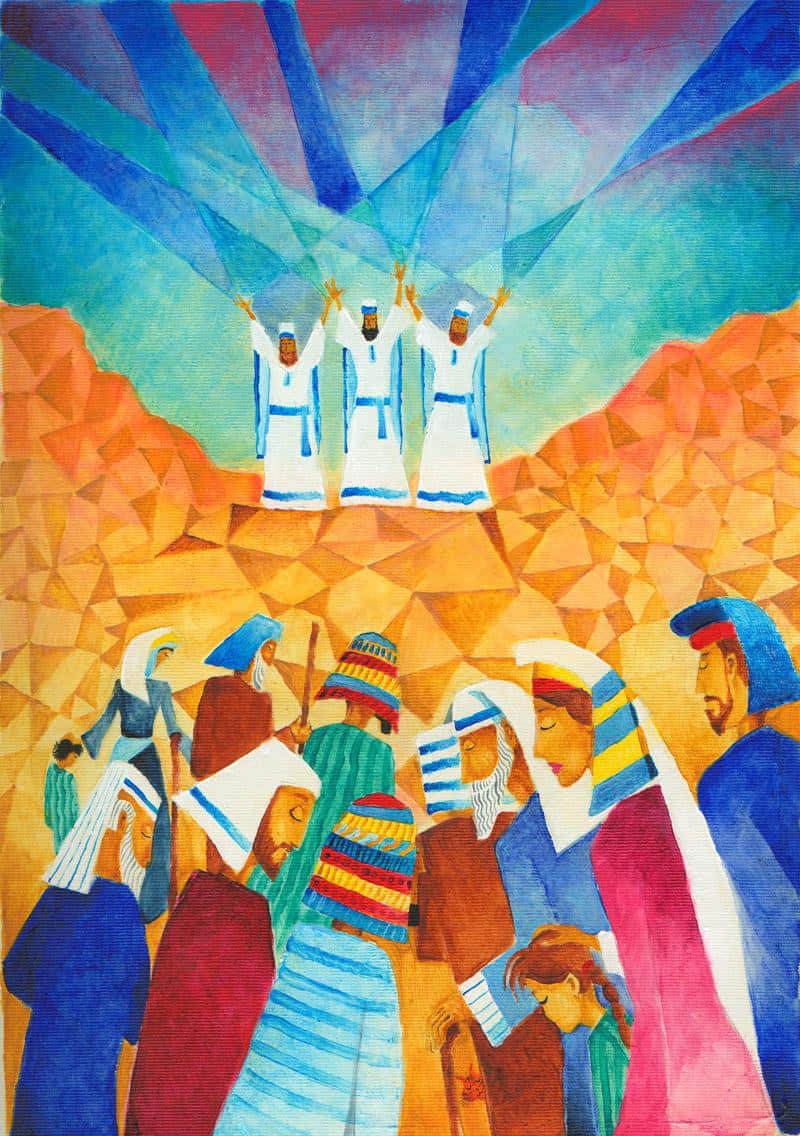Hi Bonjour / Hello [nickname_else_first_name],
Table of contents
1) Perashat Hashavoua & Shavuot - Rabbi Eli Mansour
2) Halakhat Hashavoua - Hazzan David Azerad
3) Holy Jokes!
Article on the Jews of Lebanon in Orient le jour
Part 1: see page 3
Part 2: see page 3
Part 3: see page 3
Part 4: see page 3
1)PERASHAT HASHAVOUA
This Week's Parasha Insight with Rabbi Eli Mansour
Parashat Behaalotecha: Remaining Loyal to Tradition
Parashat Behaalotecha begins with the commands given to Aharon regarding the kindling of the Menora. The Torah relates that after G-d conveyed the instructions for the lighting, "Va’ya’as Ken Aharon" – "Aharon did so" (8:3). Rashi famously comments that the Torah here praises Aharon "She’lo Shina" – for not deviating at all from Hashem’s instructions.
The Malbim (Rav Meir Leibush Weiser, 1809-1879) explains that Aharon is praised for complying with all the specific instructions, including the requirement to place precisely half a "Log" of oil in each of the seven lamps. The center lamp miraculously remained lit for longer than the other lamps, and Aharon might have thus thought that he should pour more oil into that lamp rather than rely on a miracle. But he instead did precisely what he was told, without deviating at all from Hashem’s instructions, even when he might have had a reason to.
The highest praise is "She’lo Shina" – remaining steadfastly loyal to the Torah, fulfilling Hashem’s commands without making any changes.
This praise is given to Moshe Rabbenu, as well, later in this Parasha, where we read that Hashem said about him, "Be’chol Beti Ne’eman Hu" – "He is the most trustworthy in My ‘household’" (12:7). Moshe was completely loyal and dependable. Pirkeh Abot begins by telling us that Moshe received the Torah at Sinai and then "Mesarah L’Yehoshua" – he "handed it over" to his disciple, Yehoshua. The Or Ha’haim (Rav Haim Ben-Attar, 1696-1743), commenting to the first verse of the Book of Vayikra, explains that Moshe faithfully handed over everything he learned from Hashem. He kept nothing from himself. He was impeccably loyal, transmitting every word he received from Hashem, without keeping any of it, and without changing any of the information.
Immediately after the Revelation at Sinai, Hashem commanded, "Lo Ta’asun Iti Eloheh Chesef V’eloheh Zahab" – not to create gold or silver idols (Shemot 20:19). Curiously, G-d here forbids making such images "Iti" – "with Me." Some commentators explained this word to mean that we are not to create new religious ideas and principles even if this is done "Iti," for Hashem’s sake, out of a desire to enhance His glory and serve Him. Regardless of our intentions, we are not entitled to fashion new "gods," to come up with new ideas in an effort to "upgrade" our religion.
The prophet Yehezkel (20:37) says in Hashem’s name, "Hebeti Etchem Be’masoret Ha’berit" – "I have brought you into the ‘Masoret’ of the covenant." The Radak (Rav David Kimhi, France, 1160-1235) explains the word "Masoret" as a derivative of the root "A.S.R.," which means "bound," or "locked." Commitment to tradition means that we are "locked," bound by the strict rules and guidelines of our tradition, without the freedom to change what we decide we want to change.
It occasionally happened that when Hacham Matloub Abadi (d. 1970) was asked a Halachic question, and ruled stringently, the person who posed the question would try to pressure the Rabbi to rule leniently. The Hacham would hold his hands together, as though they were chained, and say, "What can I do? My hands are bound to the Rambam! I can’t do whatever I want!"
This must be our approach to Halacha and to tradition – steadfast loyalty, without ever allowing ourselves the freedom to make so-called "improvements" to the Torah.
May we be worthy of the praise given to Aharon, that he never deviated from Hashem’s commands, and of the praise given to Moshe, that he was a loyal and trusted servant of Hashem.
2) HALAKHAT HASHAVOUA
Selected & translated by David Azerad, Hazzan Maghen Abraham
Laws of Torah study, according to the rulings of the late Maran Rabbi Obadiah Yosef Z”TL
What is the value of studying Torah?
The commandment of Studying Torah is weighed against all the commandments, as it is mentioned in the Tractate Pe’aa "And Talmud Torah against all."
(מסכת פאה פ"א מ"א): "ותלמוד תורה כנגד כולם".
And King Solomon said (Proverbs 11:11): "For wisdom is better than pearls, and all things are not equal in it", "all things" - including even objects of heaven. And the sages said: "All the commandments of the Torah are not equal to one word of the Torah" (Yerushalmi Pe’aa)
"Those who engage in the Torah, their virtue is greater than the prophets" (The Holy Zohar Parshat Tzav Daf 35 Amud A).
Mitzvah and Torah study - which comes first?
If you are given an opportunity to study Torah and do another mitzvah at the same time and you have the choice, how should you proceed? If it is possible for the Mitzvah to be done by others, you should not stop from studying Torah, however if it is not possible for it to be done by others, then you should do the mitzvah and then return to your study of Torah. Because the purpose of studying the Torah is to keep it, as we say "learn and teach to keep and do and keep".
"ללמוד וללמד לשמור ולעשות ולקיים".
Bevirkat Shabbat Shalom Umevorach
David Azerad
3) HOLY JoKeS!!
Selection of funny snippets, loosely related to this weeks parashah, to brighten your day
on being an elder










